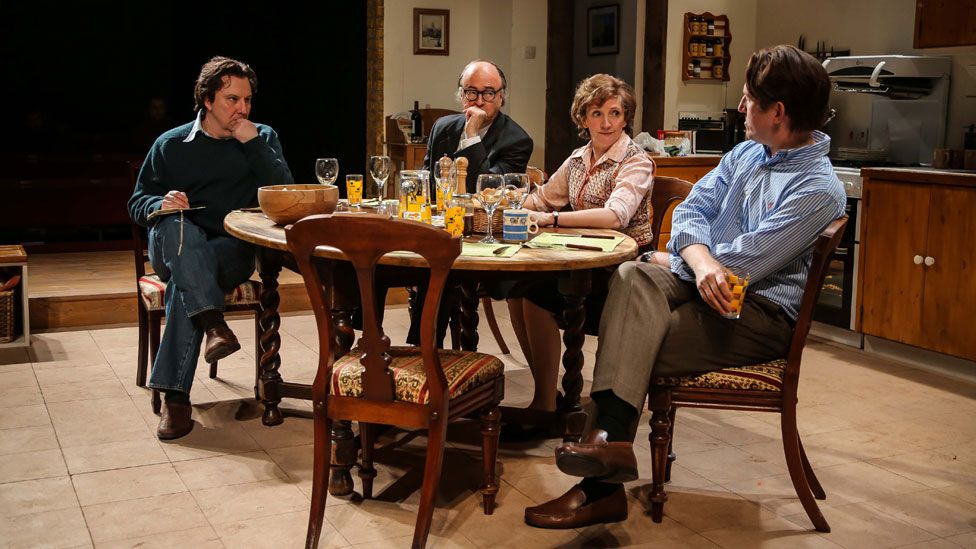SDP's 'Gang of Four' reunited on stage
- Published

L to R: Paul Chahidi as Bill Rodgers, Roger Allam as Roy Jenkins, Debra Gillett as Shirley Williams and Tom Goodman-Hill as David Owen
What can a play about the formation of the SDP in 1981 tell us about today's political landscape?
In the annals of great political statements, the Limehouse declaration isn't exactly up there with the Gettysburg Address or "Peace for our time".
Yet the statement issued by Labour's so-called "Gang of Four" that they were leaving to form their own Social Democratic Party still occupies an important place in British political history.
Now, 36 years on, the story behind that moment is being retold in a play that, on stage at least, sees David Owen, William "Bill" Rodgers, Shirley Williams and the late Roy Jenkins reunited.
It arrives at a point when Labour is once again riven by internal divisions - prompting some to ponder whether another breakaway could be on the cards.
Bill Rodgers, Shirley Williams, Roy Jenkins and David Owen in 1981
Set on 25 January 1981 in the kitchen of Owen's London home, Limehouse imagines the "gang" coming together to thrash out the details of their departure.
It is, concedes playwright Steve Waters, "two years of arguments, debates, persuasion and plotting concentrated into a very short span of time".
"It's fiction, but there's lots of things that come directly from reality," says Waters. "The facts of the characters' situations have been soundly researched.
"No one knows what they said that day - we don't have a record of their words. That, for me, was an invitation to write the play."
Rodgers, Williams, Owen and his wife Debbie were at London's Donmar Warehouse on Wednesday to see their pasts played out before them.
David Owen (left, seen in 1987) is played by Tom Goodman-Hill in Limehouse
That made for a nerve-wracking evening for Tom Goodman-Hill, the actor cast in the David Owen role.
"I was very glad that David and Debbie were on the back row of the stalls, because it meant they weren't in my eyeline," says one of the stars of Channel 4's Humans.
"But I've been able to meet them on a couple of occasions and talk to them about the play, so they knew what to expect."
Speaking after Tuesday's press night, Lord Owen said Waters had "obviously taken a lot of licence".
"But he has captured the debates, the agonies and the quite strong arguments we had," he went on. "In a way, he's captured the flavour of all of us."
The veteran politician, now 78, does have one cavil, however - about the wine that is shown being liberally poured, and drunk, over the play's 105 minutes.
"There was no Chateau Lafite in the Owen household," he says with a rueful smile.
For her part, Baroness Williams takes issue with a point in the play where she leaves to be interviewed by the BBC.
"I don't remember going off to do an interview, and I don't think they ever found any evidence I did," she insists.
Generally, though, she considers Limehouse to be "gripping and very authentic".
"I didn't think it would ever be a play," the 86-year-old goes on. "And who could've expected things to come full circle 35 years on?"
Waters was originally approached to write about the Labour Party of today but felt it was "almost too painful to write about".
"It's also a bit of a moving target," he continues. "But hopefully the 1980s feels like a mirror that reflects back on our time."
Debra Gillett [R] plays Baroness Williams [L] in Limehouse
Baroness Williams, though, feels Labour under Jeremy Corbyn is a different proposition from the party she and her colleagues chose to leave.
"I think it's more serious now," she sighs. "At the very heart of the party, there's no real agreement about who should be the leader."
"Corbyn is not doing everything wrong," says Lord Owen. "He represents an element that feels let down.
"But at the same time, you have to be a governing force with coherence.
"I want to see Labour back on its feet, and I hope and I pray that it's not going to take as long for Labour to get back into power as it did in the 1980s.
"Labour can recover before the next election, but if you were a betting man you'd say that it couldn't."
Roy Jenkins died in 2003 at the age of 82. Actor Roger Allam, though, hopes that he would be happy with the way he is portrayed.
"I would really like Roy to say my performance and the play gave a full and truthful voice to his view of what a modern, progressive, social democratic state should be in this country," says the Endeavour star.
"If he said that, I'd be very happy."
Limehouse runs at the Donmar Warehouse until 15 April.
Follow us on Facebook, external, on Twitter @BBCNewsEnts, external, or on Instagram at bbcnewsents, external. If you have a story suggestion email entertainment.news@bbc.co.uk, external.
- Published16 November 2016
- Published20 January 2016